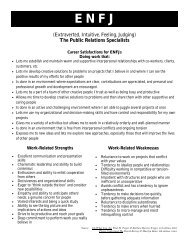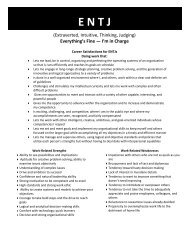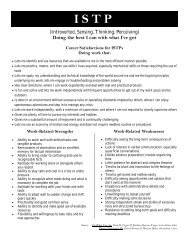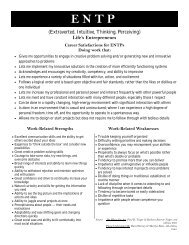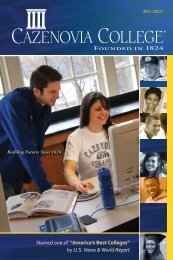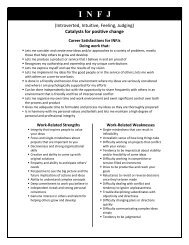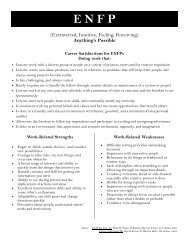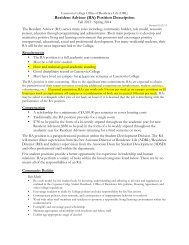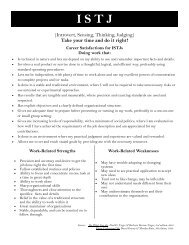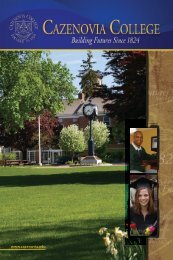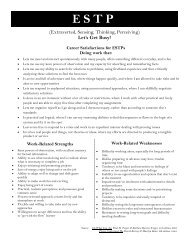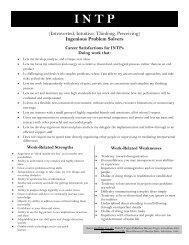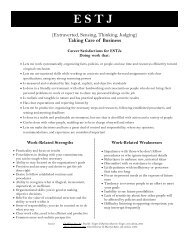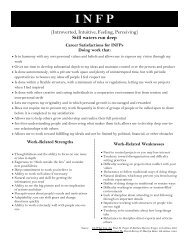of
2013-14 Academic Catalog - Cazenovia College
2013-14 Academic Catalog - Cazenovia College
- No tags were found...
You also want an ePaper? Increase the reach of your titles
YUMPU automatically turns print PDFs into web optimized ePapers that Google loves.
value conflicts. Topics include mental health, drugs and<br />
alcohol, juvenile delinquency, crime, criminal justice,<br />
stratification, racism, aging, population growth, gender roles,<br />
health care, education, the environment and the family.<br />
(Offered fall and spring terms) Prerequisite: SB 130 Introduction<br />
to Sociology or permission <strong>of</strong> the instructor<br />
SB 232 Sociology <strong>of</strong> Gender<br />
3 credits (AS)<br />
This course examines influences that social structure and<br />
social change have on gender roles in modern societies. The<br />
course challenges students to examine their preconceptions<br />
about what it means to be women and men in modern<br />
societies, develops an understanding <strong>of</strong> cultural influences on<br />
women’s and men’s development, deepens their insights into<br />
the nature <strong>of</strong> women’s and men’s roles in society, and<br />
explores the future <strong>of</strong> gender roles and personal options.<br />
(Offered on a rotating basis) Prerequisite: SB 130 Introduction to<br />
Sociology<br />
SB 234 Social Psychology<br />
3 credits (AS)<br />
This course introduces students to the social approach in the<br />
discipline <strong>of</strong> psychology. The course focuses on how the<br />
presence <strong>of</strong> other people influences one’s behavior and<br />
mental processes. Topics investigated include: social<br />
cognition, social influence and social relations. Students learn<br />
basic issues and methodologies prevalent in social<br />
psychology. They also evaluate social problems and examine<br />
their own beliefs and behaviors from a social psychology<br />
perspective. (Offered annually) Prerequisite: SB 120 Introduction<br />
to Psychology or SB 130 Introduction to Sociology<br />
SB 250 Cultural Geography<br />
3 credits (AS)<br />
The purpose <strong>of</strong> this class is to provide an introduction to the<br />
concepts <strong>of</strong> human geography. This will involve the study <strong>of</strong><br />
population trends and migration patterns; cultural, and ethnic<br />
differences; economic activity and settlement patterns; and <strong>of</strong><br />
human environment interactions. Comprehensive map work<br />
is an integral part <strong>of</strong> the course. (Offered annually)<br />
SB 260 Human Sexuality<br />
3 credits (AS)<br />
Human Sexuality is designed to help students better<br />
understand sexuality and sexual behavior in themselves and<br />
others. Emphasis is on the interrelationship <strong>of</strong> biology and<br />
psychology. The course examines a variety <strong>of</strong> social issues<br />
relevant to sexual attitudes and behaviors.<br />
SB 265 Alcohol and Other Drugs in Modern Society<br />
3 credits (AS)<br />
This course assists students in understanding the role and<br />
impact <strong>of</strong> alcohol and other drugs in today’s society. Topics<br />
included are historical and societal trends, political and<br />
economic issues <strong>of</strong> treatment, the nature <strong>of</strong> addictions, their<br />
effects on the family, and prevention and intervention<br />
methods. (Offered annually) Prerequisite: SB 120 Introduction to<br />
Psychology or SB 130 Introduction to Sociology<br />
SB 268 Community Psychology<br />
and Social Change<br />
3 credits (AS)<br />
This course examines how communities function and change<br />
through social and environmental factors. The changing roles<br />
<strong>of</strong> psychologists in community-oriented work and the<br />
development and evaluation <strong>of</strong> programs for the elimination<br />
<strong>of</strong> a variety <strong>of</strong> problems in living are discussed. Prerequisite: SB<br />
110 Introduction to Anthropology, SB 120 Introduction to Psychology<br />
or SB 130 Introduction to Sociology<br />
SB 285 Liberal Studies Internship<br />
3 credits (CS)<br />
The Liberal Studies internship is an elective course that gives<br />
liberal studies students the opportunity to test career options<br />
related to their area <strong>of</strong> study. The internship includes a set <strong>of</strong><br />
preliminary class meetings on pr<strong>of</strong>essional conduct and their<br />
connections to liberal arts study. Seminars accompany the<br />
internships to allow for exchange <strong>of</strong> information about<br />
students’ internship experiences. The College makes final<br />
arrangements for the internship placement and provides<br />
transportation when possible. This course does not satisfy<br />
General Education or distribution requirements in the SB<br />
area. (Offered fall and spring terms) Prerequisites: A minimum<br />
grade <strong>of</strong> "C" in EN 101 Academic Writing I and CM 121 Effective<br />
Speaking, sophomore status, and permission <strong>of</strong> instructor<br />
SB 301 Models <strong>of</strong> Society<br />
3 credits (AS)<br />
In this interdisciplinary course, students analyze and apply<br />
theoretical models drawn from the social sciences including,<br />
but not limited to, geography, economics, history and political<br />
science. Topics discussed include the impact <strong>of</strong> geography on<br />
economic and environmental issues, international economic<br />
systems and theories, individual and collective economic and<br />
political decision-making, political systems and theories, and<br />
manifestations <strong>of</strong> authoritative and subaltern status in<br />
national and international contexts. (Offered alternate years)<br />
SB 311 Contemporary Ethnic Families<br />
3 credits (AS)<br />
This course examines the manner in which race, class and<br />
ethnicity affect family functioning styles in relation to a<br />
number <strong>of</strong> societal institutions. Students will be exposed to<br />
an overview <strong>of</strong> the uniquely diverse mixture <strong>of</strong> backgrounds<br />
found in American family life, and will examine their own<br />
ethno-cultural backgrounds to determine their impact on life<br />
experiences and choices. Students will also consider practical<br />
issues <strong>of</strong> applying the knowledge <strong>of</strong> ethno-cultural factors to<br />
their particular major. (Offered spring term) Prerequisite: SB<br />
110 Introduction to Anthropology or SB 130 Introduction to Sociology<br />
or SB 120 Introduction to Psychology or SB 201 Multicultural<br />
Contributions<br />
SB 322 Psychology Applied to Organizational Behavior<br />
3 credits (AS)<br />
This course explores the complexity <strong>of</strong> behavior within<br />
organizational settings and helps students develop the social<br />
interaction abilities necessary for pr<strong>of</strong>essional success.<br />
Academic Catalog | Cazenovia College | www.cazenovia.edu 180



